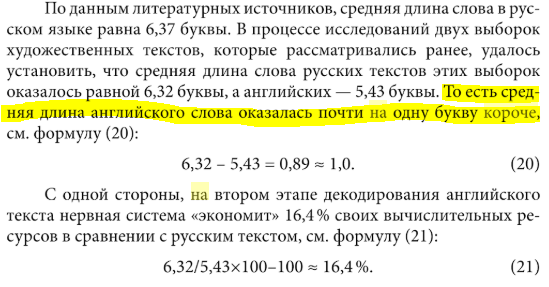Answer the question
In order to leave comments, you need to log in
Why is the average length of an English word shorter than a Russian one?
Various sources give the following statistics: the average length of a word in English is shorter than in the case of Russian. Various statistical indicators are given, one of them is this: 
From the course of school computer science, we remember that using, for example, the Shannon formula and the concept of the amount of information, we can conclude that the text in English can be encoded in fewer bits than the text in Russian.
But the question is: is there a relationship between the average word length and the number of letters in the alphabet? Or are there other hypotheses? Or is this a purely mathematical question?
Answer the question
In order to leave comments, you need to log in
The question concerns mathematics exactly in those questions that you voiced. In general, this is a matter of history, archeology and, first of all, etymology and linguistics.
English is a natural language. And all his words are just a historical accident. Of course, if we use more letters, having the same length in the message, we can encode more information. But as you know, there are fewer letters in the English language. There is no good reason here, it just happened historically: people spoke as best they could, randomly inventing their entire language, polishing it over the years, and now we have what we have.
A rather interesting video about the Russian language and its history, gives some understanding of how various languages appear:
https://www.youtube.com/watch?v=vDSn1HWY8J8
"Russian mat is the language of combat control and part of the military culture of Russia." Here
Purely theoretically, we can say:
N - the number of words in the language
A - the number of letters in the alphabet
Then all words can be written using k letters:
A^k=N
Accordingly, the more letters, the shorter the length of the word.
But this, of course, has nothing to do with real life.
Didn't find what you were looking for?
Ask your questionAsk a Question
731 491 924 answers to any question